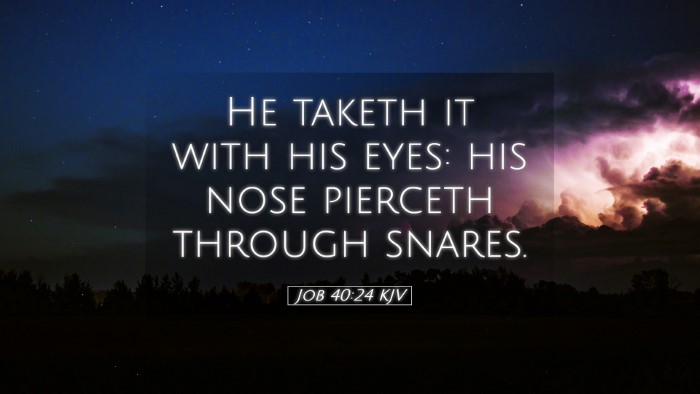Old Testament
Genesis Exodus Leviticus Numbers Deuteronomy Joshua Judges Ruth 1 Samuel 2 Samuel 1 Kings 2 Kings 1 Chronicles 2 Chronicles Ezra Nehemiah Esther Job Psalms Proverbs Ecclesiastes Song of Solomon Isaiah Jeremiah Lamentations Ezekiel Daniel Hosea Joel Amos Obadiah Jonah Micah Nahum Habakkuk Zephaniah Haggai Zechariah MalachiJob 40:24
Job 40:24 KJV
He taketh it with his eyes: his nose pierceth through snares.
Job 40:24 Bible Commentary
Job 40:24 - "He taketh it with his eyes: his nose pierceth through snares."
This verse features God’s rhetorical challenge to Job regarding the power and intricacies of creation, particularly focusing on the creature known as "behemoth," often interpreted as a great beast, possibly a hippopotamus or dinosaur, showcasing the magnificence of God’s handiwork. The following commentary synthesizes insights from several esteemed public domain sources.
Understanding the Context
Matthew Henry emphasizes that the Book of Job is a profound exploration of suffering and divine justice. In this section, God speaks to Job out of a whirlwind, challenging him with questions that reveal Job’s limited understanding of the created order.
The Power of Creation
Albert Barnes notes that God is illustrating His sovereignty over creation, particularly with respect to creatures that humans cannot control or comprehend. The imagery employed here serves to magnify God’s dominion as He points to a creature that, even in its strength, is under divine authority.
The Symbolism of Behemoth
In examining "behemoth," Adam Clarke suggests that this creature symbolizes the untamable aspects of nature that men cannot dictate. The mention of the creature taking snare with its eyes reflects a symbolic representation of its acute awareness and instinct, which parallels God's omniscience in discerning the actions of humanity.
Eyes and Awareness
The phrase "taketh it with his eyes" implies an attentive observation of its surroundings. Matthew Henry remarks that this highlights not just the creature's might but also its capability to navigate its environment effectively, a quality venerated in the context of God’s creation.
Nose and Piercing Through Snares
Albert Barnes delves into the idea of the creature using its nose to pierce through snares, indicative of its strength to endure challenges and obstacles. This ability represents not only physical prowess but also a metaphorical armor against the traps set by adversaries, whether in nature or the experiences of life.
Theological Implications
The theological implications in this verse resonate with the concept of God's providential care and control over all aspects of creation. Adam Clarke proposes that this serves as a divine reminder to Job (and, by extension, to every believer) that God's wisdom surpasses human understanding and that His plans unfold in ways that may appear incomprehensible at times.
Human Limitations
Matthew Henry highlights the limitations of human perspective, illustrating how Job's previous complaints stem from a finite understanding. The more Job is confronted with divine power, the clearer it becomes that his suffering is a part of a larger tapestry woven by God's omniscience.
Divine Sovereignty
Echoing the sentiments of Albert Barnes, the emphasis on God’s sovereign rule is twofold: He governs creation and oversees the intricate details of existence. Job's challenge, at its core, lies in accepting that human frailty does not diminish God's purpose.
Conclusions for Believers
The message within Job 40:24 extends to believers today, serving as a call to humility and trust in the Creator. As Matthew Henry poignantly notes, recognition of our place in the universe, under the vast shadow of God’s supremacy, leads to a more profound faith.
Reflection and Application
- Seek to understand the divine nature in the complexities of life.
- Recognize the importance of faith even amidst suffering and uncertainty.
- Trust in God's inherent wisdom, realizing that there is a divine order to our experiences.
Final Thoughts
In summary, Job 40:24 is a profound affirmation of God’s omnipotent wisdom and control over creation. The insights drawn from Matthew Henry, Albert Barnes, and Adam Clarke enrich our understanding, encouraging us to acknowledge our limitations while embracing faith in a God who expertly manages the intricacies of both the human heart and the vastness of nature.


